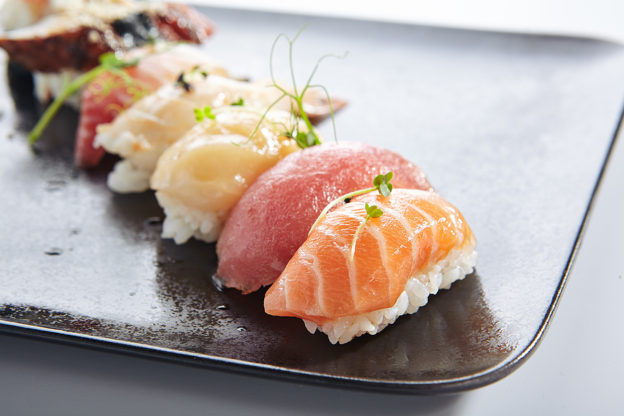By David Blyweiss, M.D., Advanced Natural Wellness
October 20, 2021
Sushi isn’t one of my “go-to” foods, but I get the appeal.
Fish is a low-calorie source of protein and packed with healthy omega-3 fats that promote good health. Roll it together with rice, seaweed and veggies, and you’ve got your proteins, fats and carbs all prepared in convenient bite sized pieces.
It’s a light and refreshing meal that some people would love to eat every day of the week.
But while you might be tempted to schedule a daily lunch-date with your favorite sushi roll or sashimi, you’re probably concerned about how much mercury you’re eating. (If you’re not, you should be.)
Mercury is a toxic heavy metal that can cause neurological problems. Some of the symptoms of mercury toxicity include…
- Changes in visions, hearing or speech
- Numbness or a “pins and needles” feeling in the extremities or around the mouth
- Loss of coordination
- Muscle weakness
- Memory problems and irritability
All fish contain mercury. But some fish contain more of it than others. These include popular fish used in sushi rolls and sashimi, like tuna, yellowtail, sea bass and bluefin.
MD Exposes the Hidden Danger to Your Eyes

When your eyesight starts to fail, it's a real problem. Suddenly you can't go to the grocery store... you can't get to the doctor if you have an emergency... you can't meet your friends for dinner…
Your "regular" doctor doesn't have time to keep up with the latest research. And the same goes for eye doctors. They go to school to learn how to fit you for glasses and contacts, but have no way of preventing the damage and loss of eyesight that threatens your freedom and independence.
Let me show you something that explains a LOT about how your eyes work.
In my FREE Special Report, I'll show you a HUGE, untapped resource for your eyes that safely and naturally restores clear, effortless eyesight.
Click here to get started...
And it’s not just the mercury in fish that you have to think about.
I’ve seen the infinitesimal parasite worms in raw fish, and don’t want them in my body. Eating fish infected with them can cause a condition called anisakiasis. This is when the worm attaches to your stomach, intestines or esophagus and can cause severe pain and food poisoning. Anyone who eats undercooked or raw fish or squid is at risk.
What about that Rice?
To add insult to injury, the rice that’s around that sushi is laden with arsenic. It comes from the soil and irrigation water the rice is grown in.
Just recently I saw a news report about rice water and rice syrup used in baby food manufacturing. They’re having a crisis over it because of the high levels of arsenic in it. A US Congressional report found that out of 168 baby foods from major manufacturers, 73% contained arsenic. Even in trace amounts, arsenic can stunt a child’s IQ and brain development.
In adults, a high intake of rice is associated with chronic disease outcomes such as diabetes, lung disease, cancers and cardiovascular disease.
And by the way, brown rice often contains higher levels of arsenic compared to white rice. That’s because brown rice keeps the bran, which is where the arsenic is concentrated.
You can take arsenic out of the equation by avoiding rice altogether. Just order your sushi rolls Naruto style. This means the roll is wrapped in thin slices of cucumber instead of rice. Sashimi, which is served without rice, is another good option.
How to Lower Your Sushi-Related Toxic Burden
You can reduce the toxic burden associated with sushi by making just a few changes.
The World's Quickest Solution for Ending Prostate and Urinary Misery
This has recently been revealed to be one of the only real breakthroughs in prostate health.
The seeds of a strange fruit (sometimes called "Chinese Apples") hold powerful phytonutrients that are a revolution in prostate health.
In fact, UCLA and Veterans Administration research have now proved this to be true.
Not only that, but it may be the worlds quickest solution for ending prostate misery.
Simply stated, these phytonutrients represent a huge step beyond beta sitosterol, saw palmetto, and other phytosterols alone.
Simply click HERE if you want to have fast prostate relief...restful, uninterrupted sleep...no more constant "urges to go"...enhanced virility...and optimal prostate support for life.
Limit your consumption of fish to twice a week. This includes both sushi and fish that is cooked or canned. And try to avoid high mercury options like tuna, yellowtail, sea bass and bluefin.
Switch things up. Don’t eat the same type of fish more than two or three times a month. And if you eat a high mercury dish, swap it out next time for one that’s low mercury. For example, if you tuna on Monday, eat a lower mercury fish like salmon later in the week.
Add more sulfur-containing foods such as garlic, onion, broccoli, kale, cauliflower, leeks and bok choy to your diet. Toxic metals like mercury have an affinity for these kinds of food.
I also recommend supplementing with N-acetyl cysteine (NAC) and alpha lipoic acid (ALA). These two glutathione precursors act as chelators to help move arsenic, mercury and other metals out of your body faster.
As far as parasites go, you always have the option to skip the raw fish. I like vegetarian sushi. But you can also get eel, which is always cooked. Grilled squid or octopus is another good choice. And the California roll uses that fake crab meat, but it’s not raw.
If you are eating raw sushi, add more fresh garlic to your diet and supplement with 600 mg of aged garlic extract daily. Garlic is a natural broad-spectrum antimicrobial that helps protect against parasites, bacteria, fungi and viruses. Wormwood extract can also be used to reduce parasitic digestive issues.
And move your bowels regularly… two or three times a day if you can. There are plenty of all natural, plant-based foods that contain fiber to help keep you regular. Peas, green beans, sweet potatoes and artichokes. Avocados, apples, pears and berries. Legumes, nuts and seeds.
Avoid that soggy cereal, semi-stale bran muffin and dry whole wheat bread. Those grains aren’t going to provide the healthy fiber you need to clear your bowels regularly.
SOURCES:
González N, Correig E, Marmelo I, Marques A, et al. Dietary exposure to potentially toxic elements through sushi consumption in Catalonia, Spain. Food and Chemical Toxicology. 2021;153:112285.
Fiorenza EA, Wendt CA, Dobkowski KA, King TL, Pappaionou M, Rabinowitz P, Samhouri JF, Wood CL. It’s a wormy world: Meta-analysis reveals several decades of change in the global abundance of the parasitic nematodes Anisakis spp. and Pseudoterranova spp. in marine fishes and invertebrates. Glob Chang Biol. 2020 May;26(5):2854-2866.
Lai PY, Cottingham KL, Steinmaus C, Karagas MR, Miller MD. Arsenic and Rice: Translating Research to Address Health Care Providers’ Needs. J Pediatr. 2015;167(4):797-803.
Arsenic. World Health Organization. © 2021 WHO.
New Disclosures Show Dangerous Levels of Toxic Heavy Metals in Even More Baby Foods. Subcommittee on Economic and Consumer Policy Committee on Oversight and Reform. U.S. House of Representatives. September 29, 2021.
Gruber JF, Karagas MR, Gilbert-Diamond D, Bagley PJ, Zens MS, Sayarath V, Punshon T, Morris JS, Cottingham KL. Associations between toenail arsenic concentration and dietary factors in a New Hampshire population. Nutr J. 2012 Jun 29;11:45.
Patrick L. Mercury toxicity and antioxidants: Part 1: role of glutathione and alpha-lipoic acid in the treatment of mercury toxicity. Altern Med Rev. 2002 Dec;7(6):456-71.
Patrick L. Toxic metals and antioxidants: Part II. The role of antioxidants in arsenic and cadmium toxicity. Altern Med Rev. 2003 May;8(2):106-28.
Sears ME. Chelation: harnessing and enhancing heavy metal detoxification–a review. ScientificWorldJournal. 2013;2013:219840.
Zeng Y, Li Y, Yang J, et al. Therapeutic Role of Functional Components in Alliums for Preventive Chronic Disease in Human Being. Evid Based Complement Alternat Med. 2017;2017:9402849.
Szopa A, Pajor J, Klin P, et al. Artemisia absinthium L.-Importance in the History of Medicine, the Latest Advances in Phytochemistry and Therapeutical, Cosmetological and Culinary Uses. Plants (Basel). 2020;9(9):1063.







